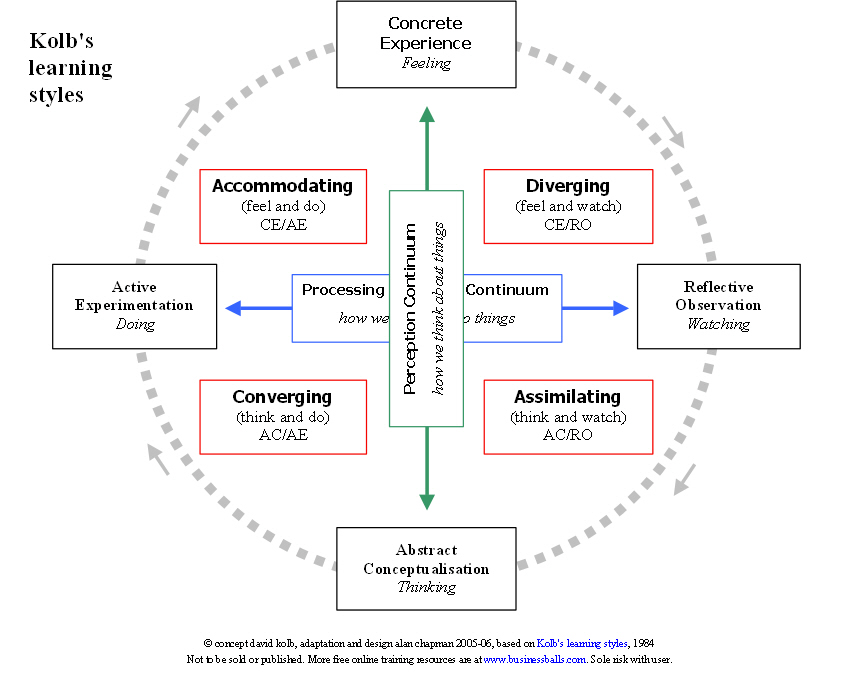A Personal Reflection of Trends in perception of the Learner in UK Education
A look at the diagram to the left show's a mainstay of what has been part of British Education practice for a number of years. The use of Learning Styles has been part of CPD in English schools through out the drive of the implementation and improvement of the national curriculum towards individual learning.
I have personally received many photocopied transcripts of how we should tailor individual learning plans to the student. The idea that everybody learns differently has been an unwritten law (as opposed to theory). Tailoring the learning process to individual perceptions of how they learn has passed into educational aspiration and often Ofsted criteria.
A few years ago in the institution that I worked in one of the first lessons of the year in PSHE (Personal, Social and Health Education) was to survey the pupils and decide with them which Kolb learning style they fitted into. They were then instructed to write it down in their planner. The grand scheme was to gather the data together at school level to inform teaching and shape individual learning experiences. The staff were informed for a few weeks after that senior staff would be making drop-in visits to classes and asking children if they knew their individual learning styles. Ofsted then came and went. The effort to pursue the Individual Learning Plan along the Every Child Matters and every child is a child with special needs was somewhat lost in the mist.
The idea of Thinking skills has been part of supportive Science teaching for a few years through CASE (Cognitive Acceleration for Science Education). A similar project CAME has been formulated for a few years. The basis of the work is the theories of Piaget and Vygotsky. The CASE approach, which I have taught myself, is a set of activities teaching skills in addition to present national curriculum. It does produce results in improving thinking skills. However, the difficulty in quantifying thinking skills and Piagetian levels against the framework of the national curriculum has been difficult. The difficulty is such that time investment in developing these critical skills is not pursued since they do not appear to add any intrinsic to data that feeds into league tables.
The focus on thinking skills has also briefly seen an interest in Edward De Bono's Six Hats (apprently used by the British Civil Service). Again this was a CPD fashion at one point (along with later Emotional Intelligence) but we did need to have a bigger hat stand at the time to be able store the new apparel. Thinking skills is still a topic kicked around on the pitch of English educational thinking. I am trying to be neutral and to stress the benefits. However, as has happened with the reactive nature of the way the National curriculum has developed there is never enough time to see the final result. There appears no willingness for a second half (to continue the analogy) or the extra time goal that makes all the effort worthwhile. The analogy of rolling the rock to the top of the hill springs to mind. Pausing half way up for a little bird (as in a little bird told me something else) to sit atop the rock. The rock starts to roll back down the hill with the added information.
So what has prompted this lurch through the potted history of UK educational thought in the last 15 years (yes only 15 years)? I read an article on the BBC website reporting the Education Ministers' Michael Goves' intention to speak at a conference on Wednesday (today). In the article we are informed that the major influence on Michael Goves' thinking comes from Dan Willingham, a cognitive scientist. The main thrust of his work proposes that Learning Styles do not actually exist. Dan Willingham's book "Why Don't Student's Like School?" will be worth reading to see the road map for education up to 2015 and beyond. Personally I think, he could have thought of a better title since the implication is that at the moment all pupils do not like school. However, this does reinforce the natural English reaction to education promoted by media to a large extent.
The reaction to the speach will be interesting to know later today. The fact that a cognitive scientist is becoming an influence is encouraging. How this fits with the drive to instil knowledge compared to understanding will be an interesting path to follow!
How the idea of their being no Learning Styles affects Online Learning and Open Learning Communities is an area for further exploration.

No comments:
Post a Comment